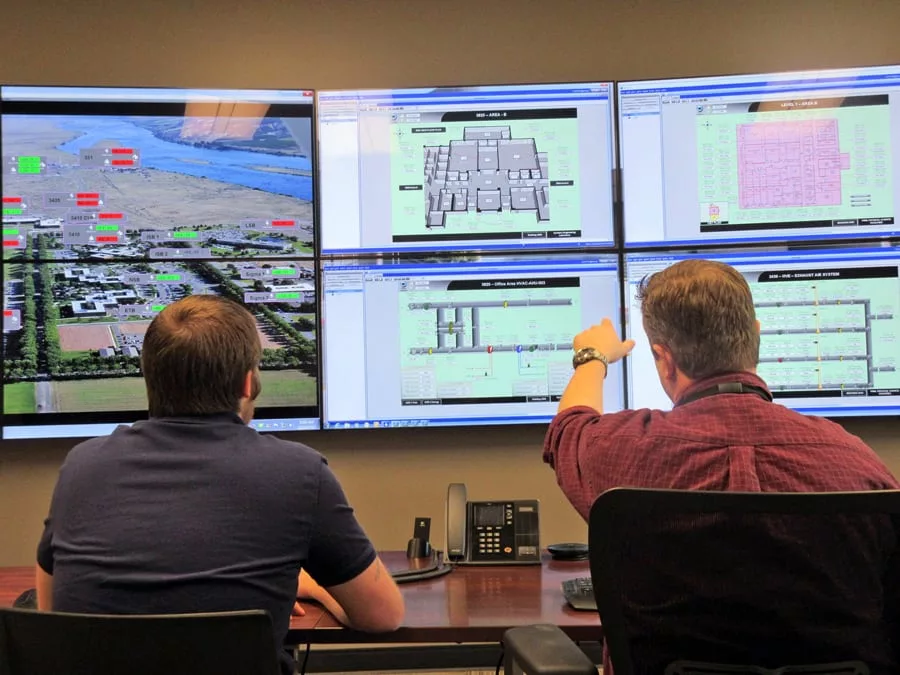
Home » Test bed advances Washington State as a hotbed of energy innovation
Test bed advances Washington State as a hotbed of energy innovation

December 30, 2015
by PNNL staff
The U.S. Department of Energy is matching a $2.25 million Clean Energy Fund grant from the Washington Department of Commerce to research, develop and demonstrate the technologies needed to create "smart" buildings, campuses and cities to better manage energy usage. Once buildings and devices are smarter — managing energy resources optimally on their own — they can also be more responsive to the needs of the power grid.
[blockquote quote="Washington is at the cutting edge of clean energy technologies," source="Washington State Governor Jay Inslee" align="right" max_width="300px"]
In what the DOE is calling a pioneering regional partnership for grid modernization, Washington will host a three-campus demonstration of transaction-based energy management. This is the first time researchers will test the use of transactive controls at this scale, involving multiple buildings and devices.
The transactive concept combines financial signals and dynamic control techniques to shift the timing and quantity of energy usage in devices, buildings and campuses resulting in greater efficiency and reduced energy costs, while also providing significant flexibility for the power grid.
DOE's Pacific Northwest National Laboratory, Washington State University and the University of Washington are teaming on the effort, which builds on their involvement in the recently completed Pacific Northwest Smart Grid Demonstration Project.
"Washington is at the cutting edge of clean energy technologies," said Gov. Jay Inslee. "We are proud to see PNNL leading DOE's efforts around energy storage and transactive energy control, and our state's two largest research universities working with public and private electric utilities to demonstrate how these technologies will enable grid modernization on a large scale."
The state is funding infrastructure for the project, to establish an enduring test bed that will enable other research projects after completion of the first DOE-funded study, which will concentrate on transactive energy management at scale. Once perfected, load flexibility available from smart buildings can help to better integrate non-traditional energy sources like wind and stationary battery power into the grid.
"It will involve a lot of communication," said Srinivas Katipamula, PNNL principle investigator and technical leader of the project. "And not just between the partners. It means equipment talking to other equipment, buildings talking to buildings and acting upon signals from the power grid."
The idea is that equipment will make decisions and automatically adjust energy loads based on pre-determined criteria related to energy prices, essential services, comfort levels, time of day, etc. The project is developing the mechanisms to make that happen with minimal human direction. Devices within buildings, and the buildings and campus operations will be automatically and continually monitored to see how they are using energy. The VOLTTRON™ platform that enables this coordination was developed by PNNL. It acts much like a cell phone operating system that allows "apps" to perform both information sensing and control actions in order to implement agreed upon actions for each
responsive building or energy resource within each campus.
With this method, both WSU and UW will manage their onsite power generation. Through the test bed, WSU researchers in the Energy Systems Innovation Center will install photovoltaic modules on the Pullman campus for the first time and integrate them into Pullman's "Smart City" test bed and WSU's micro grid system. Experiments will be designed to show campus power generation can power critical city infrastructure in the event of a power outage. WSU will also develop strategies for sharing energy between WSU's smart buildings and the solar modules.
The test bed will involve the installation of multiple smart inverters at UW, to control the power production from solar panels, and eventually feed campus-produced photovoltaic power into the power grid. UW will also add a lithium-ion battery energy storage system to increase the flexibility of the power consumption across campus, and use expertise in data analytics to analyze data and develop strategies to make buildings responsive to transactive control signals.
The test bed will allow researchers to understand how adjusting loads could help local and regional grids and, one day, benefit the campuses financially. Initially, there will be no literal financial exchanges and the pricing signals will be historic and not live data, although researchers hope to get to that point.
The research is scheduled to continue through 2017. WSU will host an energy summit on transitive campus energy systems in Spokane on March 10. The research is sponsored by DOE's Energy Efficiency & Renewable Energy Buildings Technology Office and the Office of Electricity Delivery and Energy Reliability.
Local News
KEYWORDS november 2015





